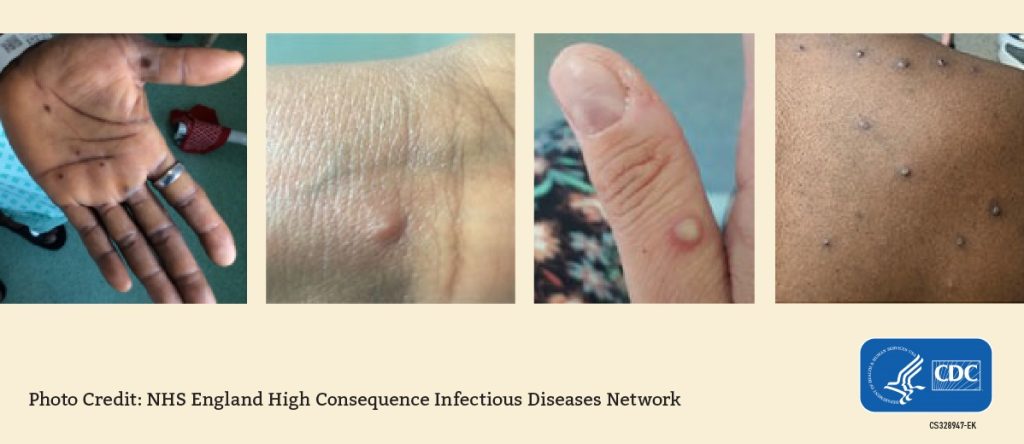Mpox is a rare contagious rash illness caused by the mpox virus which belongs to the same group of viruses as smallpox. It is primarily spread by close personal contact with someone who has mpox.
Mpox symptoms usually start within 3 weeks of exposure to the virus and are usually mild but can be severe. People with mpox often get a rash with blisters or sores. For some people, the illness starts with flu-like symptoms that begin a few days before a rash appears,
The best way to prevent mpox is by getting vaccinated, learn more about eligibility below.
What to do if you have mpox symptoms:
- Call a healthcare provider to get tested for mpox.
- Stay home if you feel sick.
Are you at high risk of mpox exposure or have been exposed?
- Call Prince William Health District at (703) 792-6300 or (703) 792-7300.
- Ask if you are eligible for the JYNNEOS vaccine that may prevent you from getting mpox.
Signs and Symptoms
Rash
The most common mpox symptom is a rash that can look like pimples or blisters and may be painful or itchy. It might develop on one part of the body or on many parts of the body.
Other possible symptoms:
- Fever
- Headache
- Muscle aches and backache
- Swollen lymph nodes
- Chills
- Exhaustion
The illness typically lasts 2-4 weeks.
People with certain conditions may be more likely to develop severe illness.
How Mpox Spreads
Anyone can get and spread mpox.
- From person-to-person from skin-to-skin contact
- Touching sores or blisters
- Sharing bedding or clothing
- Kissing and intimate contact.
Infected individuals may be contagious from the time that symptoms start (fever/flu-like symptoms or rash) until all skin lesions have formed scabs and fallen off and no other symptoms are present. This can take 2-4 weeks.
Prevention
- Avoid close skin-to-skin contact, including sexual contact, with people who are sick or have a rash.
- Avoid sharing personal items.
- Clean and disinfect personal items before other use them.
- Stay home and contact your doctor if you have symptoms.
- Get vaccinated if you are exposed to mpox or are eligible.
Remember to wash your hands often with soap and water or use an alcohol-based hand sanitizer, especially after contact with sick people.
Visit CDC's Mpox Prevention page to learn more.
- Instructions on 'How to Make a Bleach Solution' are available in English and Spanish.
- VDH Information for Hospitality Industry MPX
- VDH Información útil para el Sector Hotelero MPX
Get Vaccinated
The JYNNEOS mpox vaccine is recommended for individuals who have been exposed, or are at high risk of exposure, to the mpox virus.
You may be eligible for the JYNNEOS vaccine if you:
- You had known or suspected exposure to someone with mpox
- You had a sex partner in the past 2 weeks who was diagnosed with mpox
- You are a gay, bisexual, or other man who has sex with men or a transgender, nonbinary, or gender-diverse person who in the past 6 months has had any of the following:
- A new diagnosis of one or more sexually transmitted diseases (e.g., chlamydia, gonorrhea, or syphilis)
- More than one sex partner
- You have had any of the following in the past 6 months:
- Sex at a commercial sex venue (like a sex club or bathhouse)
- Sex related to a large commercial event or in a geographic area (city or county for example) where mpox virus transmission is occurring
- Sex in exchange for money or other items
- You have a sex partner with any of the above risks
- You anticipate experiencing any of the above scenarios
- You have HIV or other causes of immune suppression and have had recent or anticipate future risk of mpox exposure from any of the above scenarios
- You work in settings where you may be exposed to mpox:
- You work with orthopoxviruses in a laboratory
VDH has adopted CDC mpox vaccination recommendations.
The best protection against mpox occurs 2 weeks after the second shot of the JYNNEOS vaccine.
Remember it is never too late to get the second dose of the JYNNEOS vaccine even if someone received their first dose months prior.
Testing and Treatment Information
If you have mpox symptoms, get tested by a health care provider.
A healthcare worker will take 2–4 swabs of lesions (pimples or blisters) on different areas of the body and send the samples to a laboratory.
If you test positive for mpox:
- You should isolate at home.
- If you have an active rash or other symptoms, you should be in a separate room or area from other family members and pets when possible.
- Your doctor will discuss with you how to recover from this illness.
- You may receive a call from a contact tracer at Prince William Health District to learn more about your illness and other people who may been exposed to this virus.
Most people with mpox get better on their own without treatment. Pain medication like Tylenol or Advil may be needed to treat pain, learn more
Currently there are no treatments approved specifically for mpox. The antiviral treatment, tecovirimat (TPOXX) is approved to protect against smallpox and may be used to treat people with severe disease or who may be at high risk of severe disease (e.g., people with weakened immune systems and people with certain skin conditions).
More information is available at the Virginia Department of Health and CDC.

